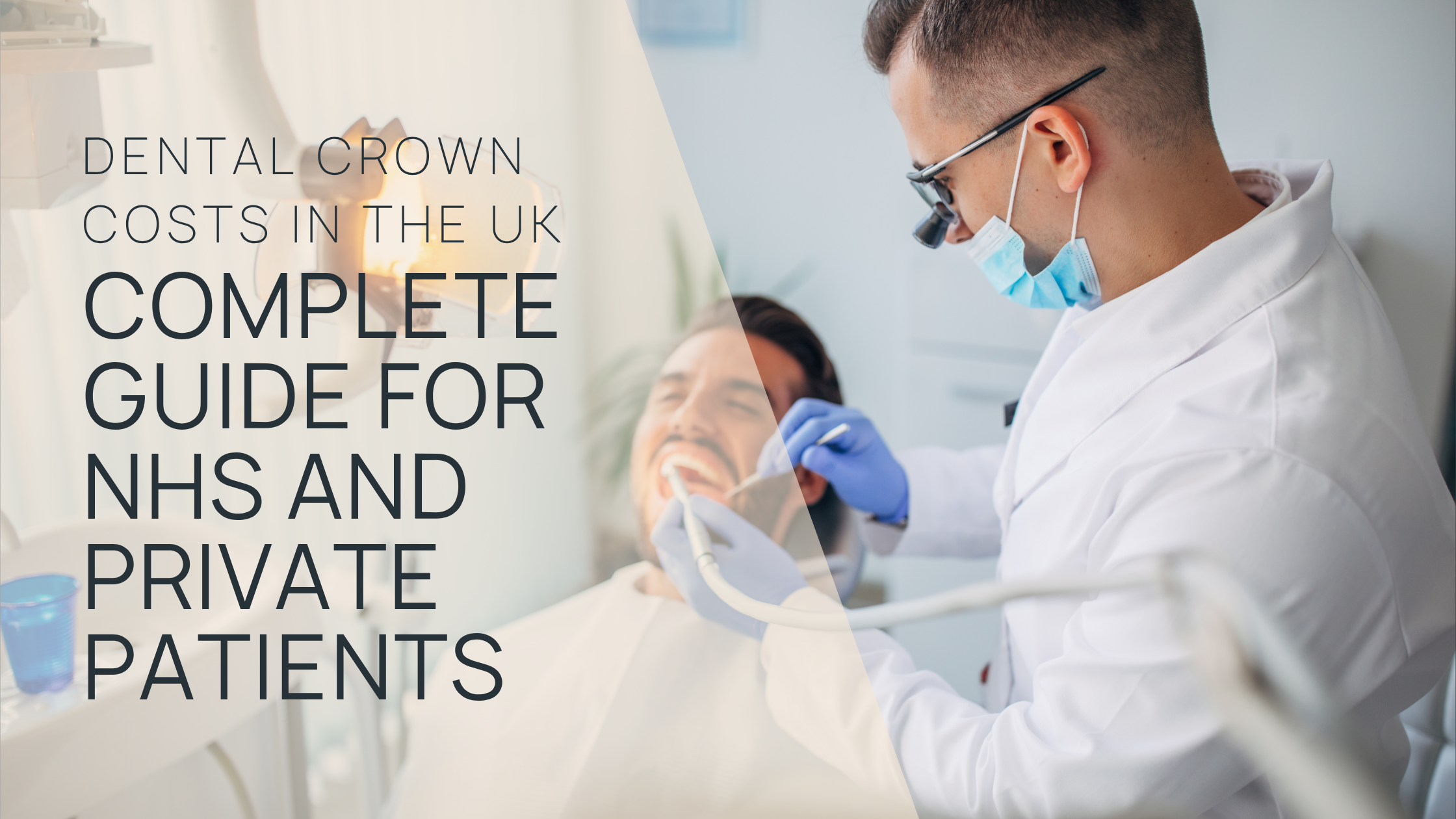Dental Crown Costs in the UK: Complete Guide for NHS and Private Patients
A dental crown serves as a protective cap that mimics the appearance of a natural tooth. It is typically placed over a weakened or damaged tooth to restore its original shape, size, strength, and aesthetic appeal. You might need a dental crown after undergoing a root canal, receiving a large filling, experiencing a tooth fracture, or to improve the look of a discolored or irregularly shaped tooth.
Crowns can be made from a variety of materials, and your choice can significantly affect the cost, longevity, and visual characteristics of the crown. Explore our range of treatments for crowns and bridges to find the best option for your needs.
How Much Does a Dental Crown Cost in the UK?
NHS Crown Costs
In the UK, dental crowns provided through the NHS are classified under Band 3 treatment. As of 2024, the fixed cost for this service in England is £306.80. This price remains constant, regardless of the crown type or the tooth being treated. It’s important to note that NHS crowns are primarily designed for functionality rather than aesthetics.
Private Crown Costs by Material
Private crown prices vary based on the material used and the clinic's location. Here's a general breakdown:
| Location | Consultation | Imaging | PFM Crown | Zirconia Crown | E-Max Crown | Single Tooth Total | Full-Mouth (24 Crowns) |
|---|---|---|---|---|---|---|---|
| Hertfordshire | £50 | N/A | £800 | £1,200 | £1,200 | £850–£1,250 | £19,200–£28,800 |
| Liverpool (Garston) | £60 | N/A | £695 | £800 | £800 | £755–£860 | £16,680–£19,200 |
| Liverpool (City Centre) | £90 | N/A | £850 | £900 | £900 | £940–£990 | £20,400–£21,600 |
| London (Marylebone) | £195 | £60–£180 | £1,200 | £1,500 | £1,500 | £1,455–£1,875 | £28,800–£36,000 |
| Brighton | Free | £45 | £495 | £495 | £495 | £540 | £11,880 |
| London (Putney) | £81 | £21 | £991 | £1,339 | £1,339 | £1,093–£1,441 | £23,784–£32,136 |
At Hospital One, we specialise in advanced all-ceramic crowns using Zirconia and E-max materials. Our crowns are fabricated in-house using CAD/CAM technology for exceptional fit and aesthetics. With survival rates of 98.2% for Zirconia and 95.4% for E-max at 5 years, and biocompatibility certified to ISO 6872, patients benefit from both safety and long-term performance.
NHS vs Private Crowns: What’s the Difference?
| Feature | NHS Crown | Private Crown |
|---|---|---|
| Cost | £306.80 (Band 3) | £700 – £1,500+ |
| Material | Often metal or basic porcelain | Choice of high-end materials |
| Aesthetics | Functional, not always tooth-coloured | Designed to match natural teeth |
| Waiting Time | Can be several weeks | Often faster, some offer same-day |
| Dentist Choice | Assigned via NHS | Freedom to choose provider |
Private crowns may be more suitable for visible front teeth or if you're prioritising long-term durability and appearance.
Which Crown Type Is Right for You?
| Need | Best Crown Type |
|---|---|
| Back molar, strong bite | Metal or PFM |
| Front tooth, high aesthetic demand | All-ceramic (E-Max, zirconia) |
| Fast treatment, minimal appointments | CEREC same-day crowns |
| Budget-sensitive, NHS eligible | NHS Band 3 crown |
Speak to your dentist to weigh up durability, aesthetics, and cost.
Are Crowns Covered by NHS Exemption?
Yes, if you meet the criteria for NHS dental fee exemptions (such as being under 18, pregnant, or receiving income-related benefits), your Band 3 treatment, which includes crowns, may be provided at no cost. Always consult with your dentist or refer to NHS guidelines to verify your eligibility.
Advanced Technology at Hospital One
At Hospital One, we utilize cutting-edge CAD/CAM technology, digital scanning, and in-house fabrication to create crowns that are both fast and precise. Our zirconia and E-max restorations comply with European standards (ISO 6872, EPS guidelines), ensuring:
Same-day crowns with fewer visits
Accurate fitting and natural-looking results
Complete material traceability and biocompatibility
High levels of patient satisfaction and stringent safety protocols
Learn more about our advanced dental technology.
Ready to restore your smile?
Book a free quote today to explore your options. Read real patient stories.
FAQs
-
NHS crowns cost £306.80. Private crowns range from £500 to £1,500, depending on material and clinic.
-
Yes, especially for front teeth or where aesthetics and longevity are important.
-
Yes, they are covered under NHS guarantees, but only for necessary treatment.
-
No, it's done under local anaesthetic. Some post-procedure sensitivity is normal but temporary.
-
Typically 5–15 years. Ceramic and zirconia crowns can last even longer with good care.

